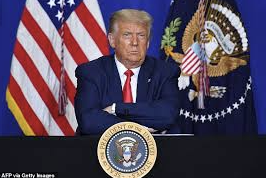Business Insider
In an overlooked lawsuit, Donald Trump’s lawyers are exhibiting a habit from his White House days: Hunting for anonymous sources.
In transcripts of four depositions obtained by Business Insider, Trump’s attorneys had the opportunity to question journalists about a mystery that has vexed them for years: Who are the anonymous consultants who reviewed the Pulitzer Prizes awarded to The New York Times and The Washington Post for their coverage of Trump’s connections to Russia?
The depositions were taken last year for a lawsuit Trump brought in December 2022, suing the Pulitzer Prize Board, which administers American journalism’s highest honors. He accused the board and its 18 members of defaming him by awarding the 2018 Pulitzer Prize for National Reporting to The Washington Post and The New York Times for their coverage of Russia’s interference in the 2016 election and the country’s connections to Trump’s presidential campaign and administration.
In his lawsuit, Trump complained that journalists and the Pulitzer board conspired together as part of a larger “Russia Collusion Hoax,” which the former president claimed was “fully debunked.”
In reality, investigations from Robert Mueller and a US Senate intelligence committee found numerous connections between Russian efforts and the Trump campaign, even as they did not conclude that Trump personally fostered them.
Much of Trump’s lawsuit focuses on a July 2022 statement from the Pulitzer board, where it announced the prizes would stand after Trump called on it to rescind the awards.
The board announced that it commissioned “two independent reviews” of the work submitted by the Times and the Post that won the 2018 prize, which “were conducted by individuals with no connection to the institutions whose work was under examination, nor any connection to each other.”
Each review independently concluded the prize-winning stories were not “discredited by facts that emerged subsequent to the conferral of the prizes,” the board said.
To this day, the Pulitzer board has not disclosed who did the reviews and what they consisted of. Nor have its members explained why they are keeping the information a secret.
Trump’s lawyers are trying to get to the bottom of it. In the depositions Business Insider obtained, Trump’s lawyers question the defendants — all journalists — about what they describe as their “use of anonymous sources” with the Pulitzer statement.
“Without identifying those individuals, I guess we have no way to verify the truth of the statement,” Trump’s lawyer R. Quincy Bird asked investigative journalist Katherine Boo in her deposition, taken in August 2023. “So Ms. Boo, I’ll ask it directly, who conducted the external review?”
At each turn, a lawyer for the Pulitzer Board members stopped their clients from answering.
The hunt for the identity of the Pulitzer board’s reviewers demonstrates how some of Trump’s attitudes toward media — an obsession with anonymous sources and paranoia of supposed shadowy figures he claims to believe are conspiring against him — have leaked beyond the political arena and into his lawsuits.
Chad R. Bowman, an attorney at the law firm Ballard Spahr, said in a deposition transcript that the identities of the people who conducted the reviews for the Pulitzer board were subject to “First Amendment privilege to protect sources.”
“I’m going to instruct the witness not to answer on the basis of First Amendment privilege,” Bowman said in the deposition.
Trump’s lawyers indicated they disagreed with Bowman’s assertion, but haven’t yet filed any court motions asking the judge to force the defendants to identify the reviewers — a step normally taken when lawyers don’t get the answers they want during a deposition.
Read more




